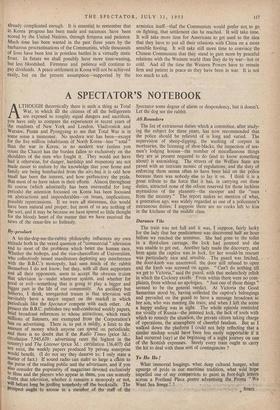By-product .A let-the-dog-see-the-rabbit philosophy influences my own attitude both to
the vexed question of commercial" television and to most of the problems which beset the human race. Whether the bishops, and the vice-chancellors ot Universities, Who collectively issued manifestoes deploring any interference With the B.B.C.'s monopoly, had seen much of the rabbit themselves I do not know; but they, with all their supporters and all their opponents, seem to accept the obvious truism that television is—under whatever system, and whether for good or evil—something that is going to play a bigger and bigger part in the life of our community. An ancillary but hitherto, I think, unregarded truism is that television will inevitably have a major impact on the market in which Periodicals like the Spectator compete with each other. At Present the B.B.C. publishes twp well-conducted weekly papers, brief broadcast references to whose attractions, which reach Millions of listeners, are exempted from the Corporation's ban on advertising. There is, to put it mildly, a limit to the amount of money which anyone can spend on periodicals; and there is no doubt that if the Radio Times (price 3d.: circulation 7,945,639: advertising rates the highest in the country) and The Listener (price 3d.: circulation 136,407) did not exist, the weekly papers produced by private enterprise Would benefit. (I do not say they deserve to; I only state a Matter of fact.) If sound radio can stake so large a Aim to the purse of the reading public and the advertisers, and if you also consider the popularity cif. magazines devoted exclusively to films and the players who appear in them, you can scarcely doubt that television, whether it remains a monopoly or not, Will before long be jostling somebody off the bookstalls. The prospect ought to arouse in a member of the staff of the Spectator some degree of alarm or despondency, but it doesn't. Let the dog see the rabbit.


































 Previous page
Previous page